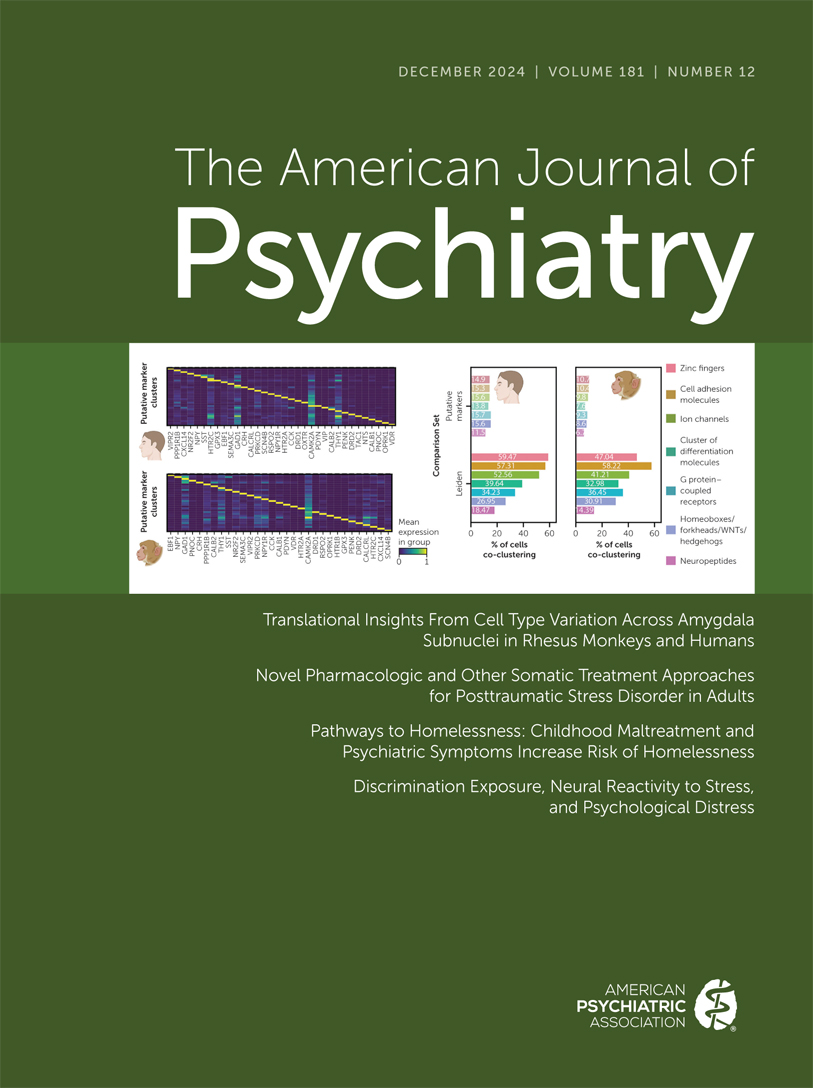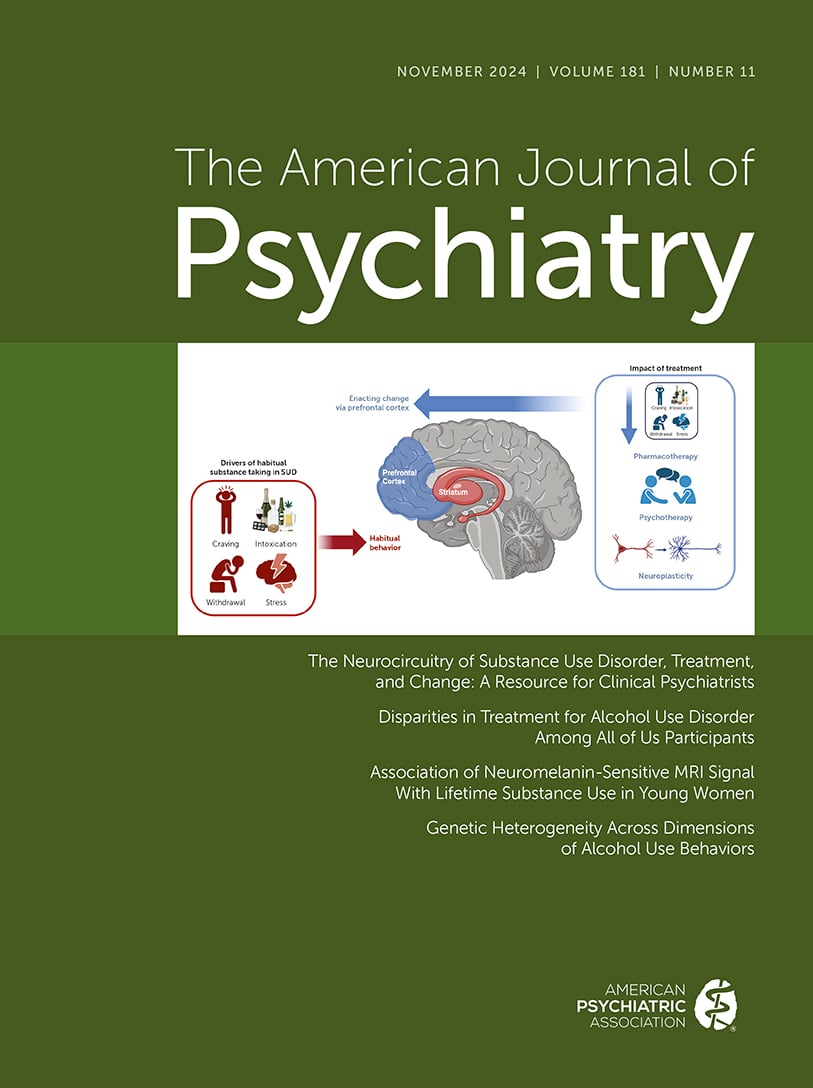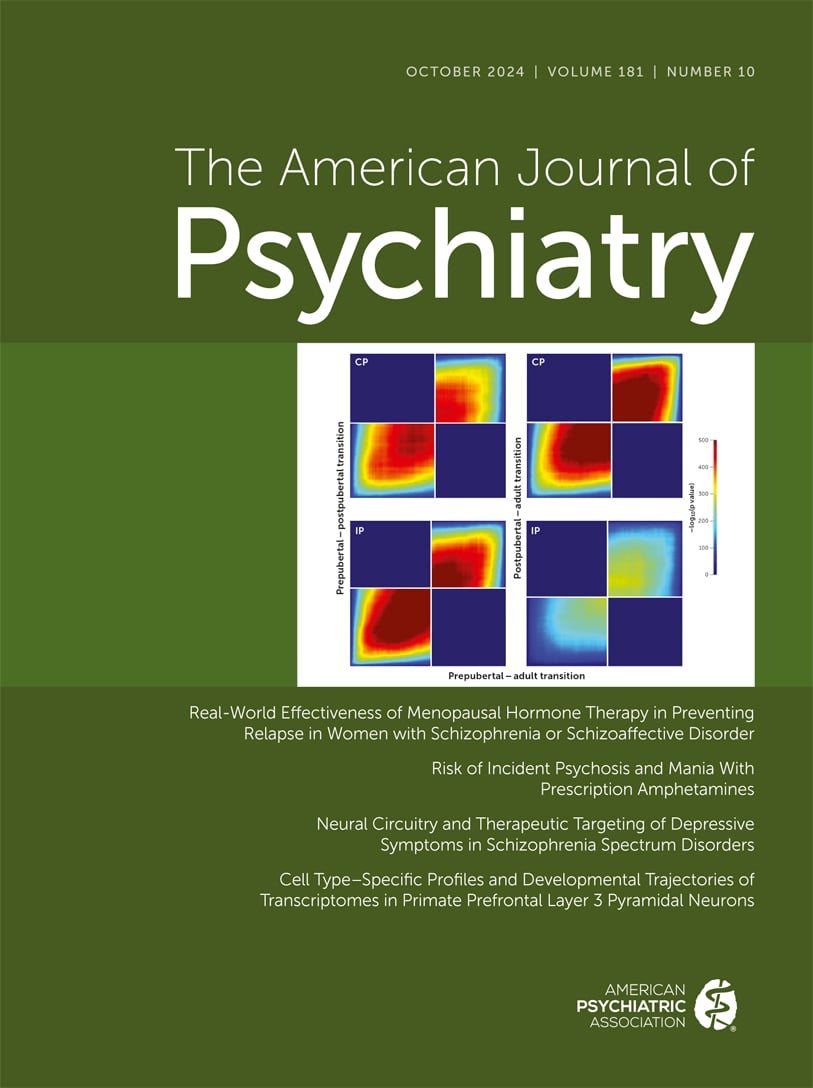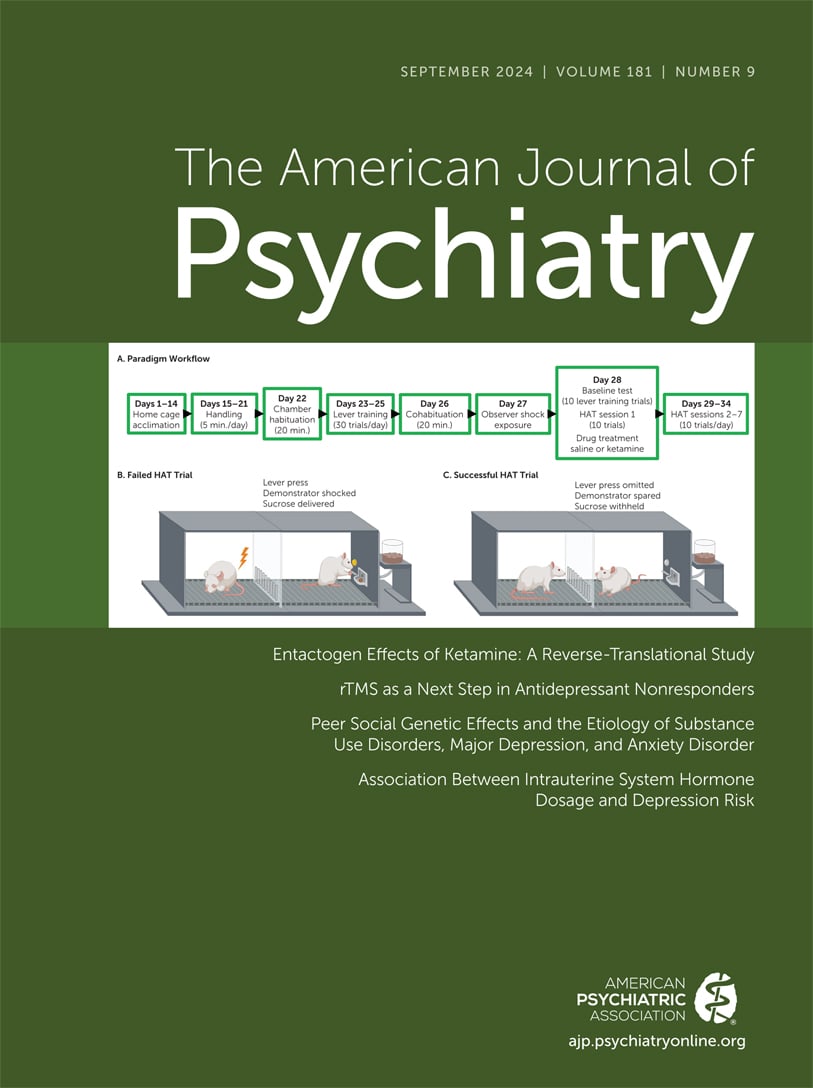American Journal of Psychiatry
- Volume 161
- Number 2
- February 2004
In This Issue
Editorial
Reviews and Overviews
Publication date: 01 February 2004
Pages195–216OBJECTIVE: Most research on the effects of severe psychological stress has focused on stress-related psychopathology. Here, the author develops psychobiological models of resilience to extreme stress. METHOD: An integrative model of resilience and ...
https://doi.org/10.1176/appi.ajp.161.2.195Publication date: 01 February 2004
Pages217–222OBJECTIVE: The authors sought to determine the efficacy and acceptability of lithium for relapse prevention in bipolar disorder. METHOD: A systematic review and meta-analysis of randomized controlled trials comparing lithium with placebo in the long-term ...
https://doi.org/10.1176/appi.ajp.161.2.217Images in Neuroscience
Introspections
Clinical Case Conference
Images in Psychiatry
Article
Publication date: 01 February 2004
Pages233–241OBJECTIVE: Drug use reminders are associated with localized changes in brain activity related to intense drug wanting or craving in cocaine-dependent men. While cocaine dependence is prevalent and disabling in women, and certain clinically relevant sex ...
https://doi.org/10.1176/appi.ajp.161.2.233Publication date: 01 February 2004
Pages242–248OBJECTIVE: Methamphetamine is a highly addictive drug of abuse that is neurotoxic to dopamine terminals. The authors recently reported that decreases in dopamine transporters (used as markers of dopamine terminals) in the striatum of methamphetamine ...
https://doi.org/10.1176/appi.ajp.161.2.242Publication date: 01 February 2004
Pages249–254OBJECTIVE: The authors’ goal was to study the potential effect on cognitive function of an interaction of HIV infection and a history of alcohol abuse. METHOD: The subjects were 30 HIV-negative and 50 HIV-positive men with and without a past history of ...
https://doi.org/10.1176/appi.ajp.161.2.249Publication date: 01 February 2004
Pages255–261OBJECTIVE: Recurrent episodes of major depressive disorder are reported to have similar or stable characteristics across episodes. However, symptoms appear to be moderately stable only in consecutive depressive episodes or if episode severity is ...
https://doi.org/10.1176/appi.ajp.161.2.255Publication date: 01 February 2004
Pages262–270OBJECTIVE: The study aims were to address neuropsychological functioning across different states of bipolar illness and to determine relationships among clinical features, neuropsychological performance, and psychosocial functioning. METHOD: Several ...
https://doi.org/10.1176/appi.ajp.161.2.262Publication date: 01 February 2004
Pages271–277OBJECTIVE: This study was conducted to determine whether or not depression is associated with higher levels of inflammatory markers in patients recovering from acute coronary syndromes. METHOD: Plasma levels of soluble intercellular adhesion molecule 1 (...
https://doi.org/10.1176/appi.ajp.161.2.271Publication date: 01 February 2004
Pages278–285OBJECTIVE: This study estimates the prevalence of depression and describes the correlates and independent associations of distress and depression among U.S. men who have sex with men. METHOD: A household-based probability sample of men who have sex with ...
https://doi.org/10.1176/appi.ajp.161.2.278Publication date: 01 February 2004
Pages286–293OBJECTIVE: The authors used functional magnetic resonance imaging (fMRI) to investigate brain activation in patients with schizophrenia and major depression while they performed two tasks—a vigilance task and a mental arithmetic task—that differed in ...
https://doi.org/10.1176/appi.ajp.161.2.286Publication date: 01 February 2004
Pages294–304OBJECTIVE: Mismatch negativity is an event-related brain response sensitive to deviations within a sequence of repetitive auditory stimuli. It is thought to reflect short-term sensory memory and is independent of higher-level cognitive processes. Mismatch ...
https://doi.org/10.1176/appi.ajp.161.2.294Publication date: 01 February 2004
Pages305–314OBJECTIVE: Three thalamic nuclei—the mediodorsal nucleus, pulvinar, and centromedian nucleus—each have unique reciprocal circuitry with cortical and subcortical areas known to be affected in schizophrenia. To determine if the disorder is also associated ...
https://doi.org/10.1176/appi.ajp.161.2.305Publication date: 01 February 2004
Pages315–321OBJECTIVE: Smooth pursuit eye movements are abnormal in patients with schizophrenia. The investigators used functional magnetic resonance imaging (fMRI) to compare brain hemodynamic response during a smooth pursuit eye movement task in patients with ...
https://doi.org/10.1176/appi.ajp.161.2.315Publication date: 01 February 2004
Pages322–331OBJECTIVE: The heteromodal association cortex has been hypothesized to be selectively involved in the pathophysiology of schizophrenia. To test this hypothesis, the authors measured prefrontal, inferior parietal, and superior temporal gyrus volumes and ...
https://doi.org/10.1176/appi.ajp.161.2.322Publication date: 01 February 2004
Pages332–342OBJECTIVE: This study evaluated the effectiveness of a supervised benzodiazepine taper, singly and combined with cognitive behavior therapy, for benzodiazepine discontinuation in older adults with chronic insomnia. METHOD: Seventy-six older adult ...
https://doi.org/10.1176/appi.ajp.161.2.332Publication date: 01 February 2004
Pages343–351OBJECTIVE: The authors compared the efficacy and acceptability of continuous versus intermittent treatment with a selective serotonin reuptake inhibitor in women with severe premenstrual syndrome and determined the effects of postmenstrual symptom ...
https://doi.org/10.1176/appi.ajp.161.2.343Brief Report
Publication date: 01 February 2004
Pages352–355OBJECTIVE: The authors compared the clinical treatment given older psychiatric inpatients on a geriatric psychiatry unit and a general psychiatry unit. METHOD: The charts of 50 randomly selected general psychiatry inpatients over the age of 65 years and ...
https://doi.org/10.1176/appi.ajp.161.2.352Publication date: 01 February 2004
Pages356–358OBJECTIVE: The authors’ goal was to test the hypothesis that DSM-IV symptoms of oppositional defiant disorder and conduct disorder can be validly applied to preschoolers. METHOD: Using a semistructured diagnostic interview, they assessed rates of symptoms ...
https://doi.org/10.1176/appi.ajp.161.2.356Publication date: 01 February 2004
Pages359–361OBJECTIVE: The catechol O-methyltransferase (COMT) Val158Met polymorphism has been associated with cognitive and behavioral phenotypes in schizophrenia. Whether COMT genotype is beneficial may depend on phenotype definition. The authors examined the ...
https://doi.org/10.1176/appi.ajp.161.2.359Publication date: 01 February 2004
Pages361–363OBJECTIVE: This prospective study examines the effect of clozapine on glucose control and insulin sensitivity. METHOD: Glucose homeostasis was measured in nine female and 11 male patients with schizophrenia (mean age=30.5 years, SD=7.4) before clozapine ...
https://doi.org/10.1176/appi.ajp.161.2.361Publication date: 01 February 2004
Pages364–367OBJECTIVE: The purpose of this investigation was to evaluate the effects of clozapine and risperidone on social skill and problem solving in patients with schizophrenia. METHOD: The Wisconsin Card Sorting Test and the Maryland Assessment of Social ...
https://doi.org/10.1176/appi.ajp.161.2.364Publication date: 01 February 2004
Pages368–370OBJECTIVE: The authors used magnetic resonance spectroscopy (MRS) to assess the effect of acute administration of the selective serotonin reuptake inhibitor (SSRI) citalopram on cortical levels of γ-aminobutyric acid (GABA). METHOD: Ten healthy volunteers ...
https://doi.org/10.1176/appi.ajp.161.2.368Publication date: 01 February 2004
Pages370–372OBJECTIVE: The authors examined gender differences in response to tricyclic antidepressants. METHOD: A total of 30 randomized, placebo-controlled trials that included 3,886 patients (1,555 men and 2,331 women), submitted between 1979 and 1991 in order to ...
https://doi.org/10.1176/appi.ajp.161.2.370Letter to the Editor
Book Forum: Neuroscience
Book Forum: PIONEERS IN PSYCHIATRY
Book Forum: SOCIAL PSYCHIATRY
Book Forum: PSYCHIATRY AND THE LAW
Correction
APA Official Actions
Past Issues
View Issues Archive
Vol. 181 | No. 12

Vol. 181 | No. 11

Vol. 181 | No. 10
